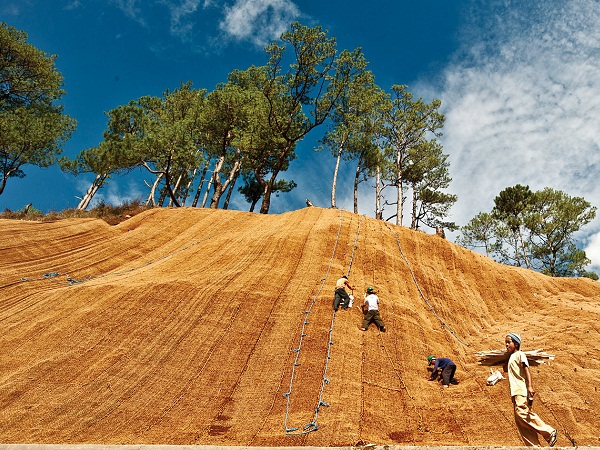DPWH uses coco fiber, natural means vs soil erosion

THIS IS a landslide-prone section of Bokod town, which worsened following the rains of Typhoon “Pepeng” in 2009. Public works engineers have terraced this mountain wall, and have planted vegetables and sunflowers to stabilize it. EV ESPIRITU/INQUIRER NORTHERN LUZON
BAGUIO CITY—The Department of Public Works and Highways (DPWH) is going back to the basics to protect mountain roads.
They are turning to cheap, natural solutions to prevent soil erosion that perennially damages roads, drainage systems, bridges and mountainsides in the upland region, said Edilberto Carabbacan, DPWH Cordillera director.
This simple solution means growing plants and vegetables, hydroseeding and using coconut fiber nets to hold the slopes, he said. The technology has been tested along the Benguet-Nueva Vizcaya Road in Bokod, Benguet, and the DPWH is replicating it in other provinces.
Carabbacan said Public Works Secretary Rogelio Singson wanted to apply this technology in other landslide-prone areas.
The process of protecting slopes starts by spreading coconut fiber nets on a specific area where plants will grow. The nets are held in place by bamboo pegs. Hydroseeding comes next, when organic mixture and seeds are spread in the area to allow plant growth and to act as erosion control.
Article continues after this advertisementCarabbacan said landslides and rock slides have been damaging or destroying roads and bridges in the Cordillera during the rainy season.
Article continues after this advertisementThe recent heavy rains dumped by Typhoon “Gener” and induced by the southwest monsoon had damaged at least P155 million worth of roads in the region, he said. Several road cuts and landslides were reported along Halsema Road in Benguet and Mt. Province and along sections of Kabayan town in Benguet.
In Baguio City, DPWH reports said damage to roads along Marcos Highway was estimated at P23 million when landslides hit sections of the highway when heavy rains hit northern Luzon recently.
“Each region has a peculiar problem when it comes to infrastructure damage. Ours are landslides and road cuts while Mindanao has problems on scouring of bridges and others have problems on flooding. We are coming up with an environment-friendly technology to restore the mountainsides and protect our roads,” Carabbacan said.
Angelita Mabitazan, head of the planning and design division of DPWH Cordillera, said coconut fiber nets cost P900 per square meter. The agency is also using marapait (native sunflower) and vetiver grass to protect the mountain slopes, she said.
She said the DPWH is studying other landslide-prone areas in Mt. Province and Ifugao to find out if coconut fiber nets could protect slopes there. Desiree Caluza, Inquirer Northern Luzon